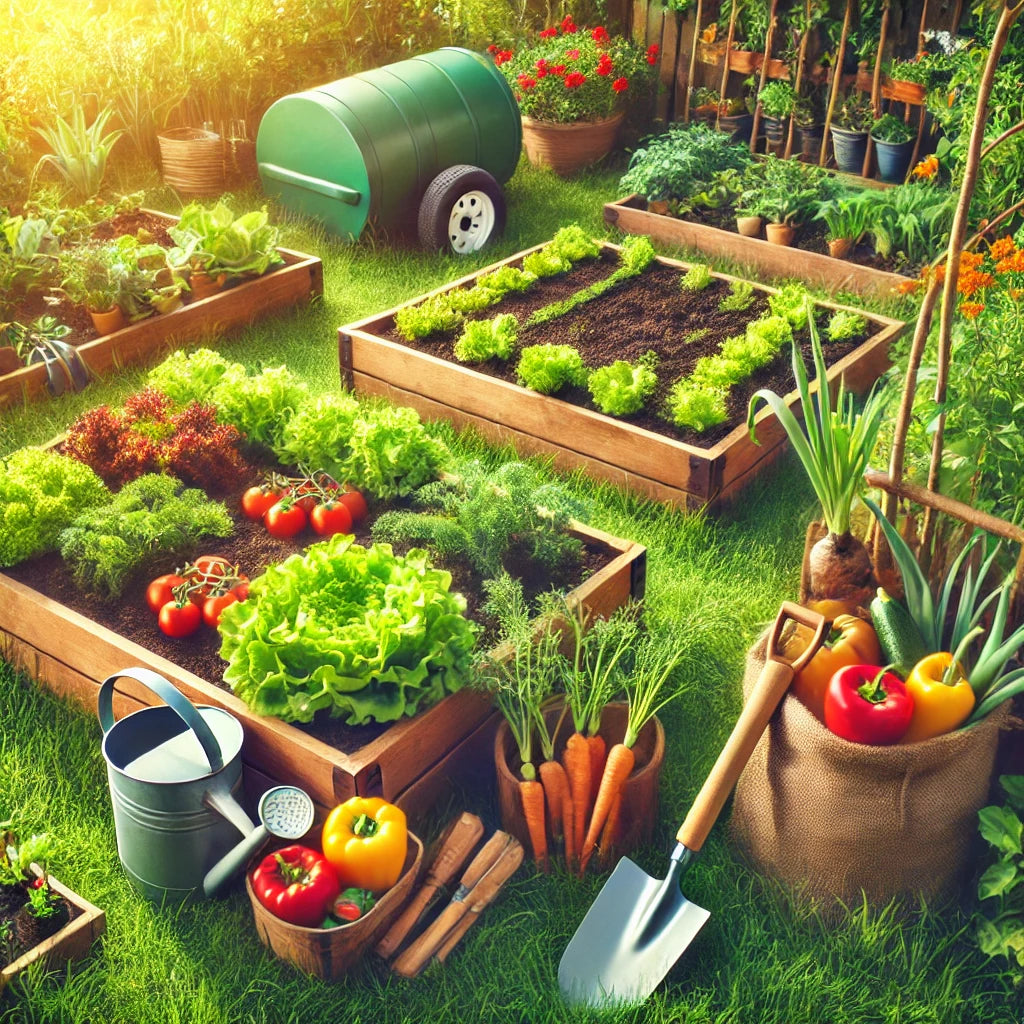The Ultimate Guide to Organic Gardening: Tips and Tools for a Thriving Eco-Friendly Garden

Introduction
Organic gardening is more than just a trend—it’s a sustainable way to grow healthy plants while protecting the environment. By avoiding synthetic fertilizers and pesticides, organic gardening promotes biodiversity, enhances soil health, and ensures that the food you grow is free from harmful chemicals. Whether you're growing vegetables, herbs, or flowers, adopting organic practices can benefit your health, your garden, and the planet.
In this guide, we’ll explore everything you need to know to start and maintain an organic garden. From soil preparation and composting to eco-friendly tools and natural pest control methods, this comprehensive guide will set you up for success in your journey to a thriving eco-friendly garden.
Starting Your Organic Garden
1. Soil Preparation
Healthy soil is the foundation of a successful organic garden.
- Test Your Soil: Use a soil testing kit to determine pH levels and nutrient deficiencies.
- Amend with Organic Matter: Add compost, aged manure, or peat moss to improve soil structure and fertility.
Recommended Product:
2. Composting
Composting is a cornerstone of organic gardening, providing nutrient-rich matter for your soil.
- Start a Compost Pile: Use kitchen scraps, yard waste, and coffee grounds.
- Maintain Balance: Combine green materials (vegetable scraps) with brown materials (dry leaves) for a healthy compost.
Recommended Product:
3. Natural Pest Control
Keep pests at bay without resorting to harmful chemicals.
- Attract Beneficial Insects: Plant flowers like marigolds or daisies to invite pollinators and predators like ladybugs.
- Use Organic Sprays: Neem oil or insecticidal soap are effective against many pests.
Recommended Product:
4. Choose Organic Seeds and Plants
Opt for certified organic seeds and plants to ensure your garden stays chemical-free.
Recommended Product:
Maintaining an Organic Garden
1. Watering Techniques
Efficient watering conserves water and keeps plants healthy.
- Water Early: Water in the morning to reduce evaporation and fungal growth.
- Use Mulch: Apply a layer of organic mulch to retain soil moisture.
Recommended Product:
2. Crop Rotation
Avoid planting the same crops in the same spot each year to prevent soil depletion and pest buildup.
- Rotate crops seasonally to replenish soil nutrients.
- Group plants with similar needs to optimize care.
3. Companion Planting
Pair plants that benefit each other to enhance growth and deter pests.
- Examples include planting basil near tomatoes to repel aphids or marigolds near vegetables to deter nematodes.
4. Weed Management
Weeds compete for nutrients and water, so managing them naturally is essential.
- Use Mulch: Suppress weed growth while enriching the soil.
- Hand Pulling: Regular weeding prevents them from seeding and spreading.
Recommended Product:
Overcoming Challenges in Organic Gardening
1. Dealing with Pests
Pests are inevitable, but they can be managed organically:
- Introduce beneficial insects like praying mantises.
- Use floating row covers to protect delicate crops.
2. Improving Soil Health
If your soil is poor, focus on organic amendments:
- Add compost and aged manure to replenish nutrients.
- Use cover crops like clover or rye to prevent erosion and fix nitrogen.
Eco-Friendly Gardening Tools and Products
Using the right tools makes organic gardening easier and more enjoyable.
- Compost Bins: Outdoor Compost Bin
- Fertilizers: All-Natural Organic Plant Fertilizer
- Gardening Gloves: Breathable Eco-Friendly Gloves
- Mulching Tools: Mulching Rake for Organic Gardens
For a full list, explore our 10 Must-Have Gardening Tools.
FAQs About Organic Gardening
Q: What’s the difference between organic and conventional gardening?
A: Organic gardening avoids synthetic chemicals and focuses on natural methods like composting, crop rotation, and companion planting.
Q: Is organic gardening expensive?
A: While some organic products may cost more initially, long-term savings come from reduced reliance on chemicals and healthier soil.
Q: How do I start an organic garden?
A: Begin by preparing your soil with organic matter, selecting organic seeds, and practicing natural pest control.
Conclusion
Organic gardening is a rewarding practice that nurtures the environment and produces healthier, chemical-free plants. By following these tips and investing in eco-friendly tools, you can create a thriving garden that benefits both you and the planet.
Ready to start your organic gardening journey? Explore our recommended products and embrace sustainable gardening today!
Disclaimer: This blog contains affiliate links. If you purchase through these links, we may earn a small commission at no extra cost to you. Prices and availability are subject to change.
